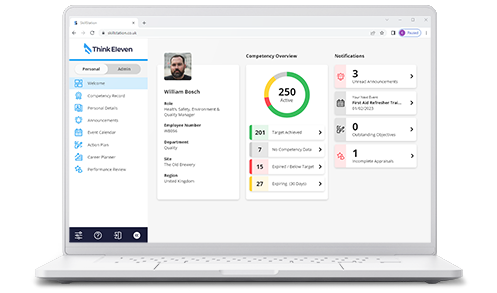Competency Management
Ensure capability and proficiency against defined standards

What is Competency Management?
Competency Management, at its core, involves systematically identifying, evaluating, and nurturing the capabilities of your workforce across various dimensions such as training, knowledge, skills, experience, proficiency, behaviours, values, and compliance. An approach that takes you beyond spreadsheets, conventional skills matrices with the aim of ensuring your workforce are optimised to perform at their very best.
It encompasses a structured approach to understanding and maximising the potential of individuals within an organisation, ensuring alignment with tactical day-to-day duties and responsibilities, plus the organisation’s strategic objectives, fostering continuous improvement.
By implementing competency management practices, in particular with the aid of competency management software, organisations can optimise employee performance, drive organisational growth, and gain/maintain a competitive edge in your chosen market.
Competency management encompasses a comprehensive approach to identifying, developing and assessing the capabilities of your workforce across various dimensions. It involves:
- Training: Selecting and evaluating the most suitable interventions to upskill your workforce, ensuring the effectiveness of training programmes and identifying areas for improvement.
- Knowledge: Assessing the depth and breadth of employees' understanding in relevant areas. Help to identify and leverage subject matter experts within the workforce.
- Skills: Evaluating the requirements and levels of proficiency required for competency framework skills. This framework will comprise of all skills required to effectively fulfil job roles.
- Experience: Recognising and leveraging employees' past experiences and expertise.
- Proficiency: Assessing the level of competence and effectiveness in performing tasks.
- Behaviours: Evaluating attitudes, work ethic, and interpersonal skills in alignment with organisational values.
- Values: Assessing alignment with organisational culture, ethics, and principles.
- Compliance: Ensuring adherence to legislation, regulation, industry standards, and organisational policies.
By systematically evaluating and enhancing these aspects, organisations can unlock numerous benefits, including:
- Optimised Employee Performance and Productivity: By identifying strengths and areas for improvement, organisations can tailor development plans to enhance employee performance and productivity.
- Identification and Addressing of Skill Gaps and Development Needs: Through targeted assessments, organisations can pinpoint skill gaps and development needs, facilitating targeted training and development initiatives to bridge these gaps effectively.
- Fostering a Culture of Continuous Learning and Improvement: Competency management fosters a culture of continuous learning and improvement by emphasising the importance of skill development and ongoing training initiatives.
- Ensuring Compliance with Regulations and Standards: By assessing and addressing compliance-related competencies, organisations can ensure adherence to regulatory requirements and industry standards, mitigating risks associated with non-compliance.
- Alignment of Workforce Capabilities with Organisational Goals and Objectives: Competency management ensures that the workforce's capabilities are aligned with organisational goals and objectives, enhancing overall organisational effectiveness and success.
In summary, competency management is a strategic process that plays a vital role in ensuring a skilled, capable, and compliant workforce, driving organisational success and growth.
Competence and training serve distinct yet interrelated purposes in the development of an individual's capabilities:
- Competence:Competence refers to the measurable ability of an individual to perform tasks or activities according to defined standards, such as procedures or standard operations. It is assessed against predetermined criteria and involves demonstrating proficiency in specific skills or knowledge areas.
- Training:Training, on the other hand, is the process or input that provides individuals with the knowledge, skills, and capabilities required to perform tasks effectively. It can encompass various methods of delivery, such as lectures, workshops, and hands-on experiences, aimed at imparting relevant knowledge and enhancing practical skills.
While training facilitates the acquisition of knowledge and skills, competence is the outcome that demonstrates an individual's proficiency in applying the knowledge and skills to perform tasks effectively.
It's imperative to recognise that competence should not be assumed but assessed and demonstrated through objective measures and evaluations.
To learn more about how competence and training can be managed with a systems based approach, read our blog article here, that breaks down the differences between a competency management system (CMS), a training management system (TMS) and a Learning Management system (LMS).
In many organisations there is still an approach and focus on training and training management, instead of competence. There is a clear difference in that training isn’t always assessed, or results in, increased capability/proficiency. When done effectively, competency management will provide the evidence to demonstrate and ensure you have:
- A safer workforce resulting in reduced risk
- A compliant workforce in the context of policy and procedure
- A more effective and efficient workforce
- A more proficient workforce
- A better engaged and optimised workforce
Attendance at a training course does not always result in improved knowledge, skills or proficiency. In fact, in the majority of cases training can sometimes simply tick a box (compliance-focused) but not actually deliver any benefit to the individual or the organisation. Many organisations still adopt and use records of training, such as a skills matrix or training matrix, but lack any form of assessment/verification as to whether the employee has achieved the required level of proficiency (competence) as a result of your investment.
At Think Eleven, we are uniquely positioned to assist with competency management:
- In-depth Understanding of Competence: Our team comprehensively understands the significance of competence throughout the entire training, learning, and development cycle. We recognise that an optimised, competent and proficient workforce is vital for organisational success.
- Holistic Approach to Training and Development: We specialise in implementing a holistic approach to training and development, ensuring that every aspect, from initial learning to ongoing skill enhancement, is meticulously addressed. This approach enables us to foster a culture of continuous improvement and skill development within your workforce.
- Systems-based Optimisation: We possess the expertise to apply a systems-based approach to competency management. By standardising and optimising your organisation's approach to competency management, we streamline processes, enhance efficiency, and help to ensure consistency across all levels.
With Think Eleven, you can trust that your competency management needs will be met with precision, professionalism, and a commitment to driving organisational excellence.
Our SkillStation competency management software allows organisations to effectively and efficiently manage competency frameworks and all associated learning and development processes. Our cost-effective and user-friendly software allows employees to take ownership of their personal development, and line-managers to review and optimise the performance of their teams.
SkillStation will digitalise your conventional approach to training and development, and in doing so:
- Reduce bureaucracy
- Centralise and standardise your records
- Provide organisational and individual data at your finger-tips
- Support wider people processes such as talent management, performance management and succession planning
- Give you full visibility and control of your greatest asset, your people
In addition to keeping a detailed history of each person’s training and assessments, SkillStation tracks your most important metric for success. Ensure that your organisation creates actual value from your investment in training and assessment by managing and ensuring the proficiency of your people.
SkillStation clearly shows the proficiencies of each person, and allows fast interrogation when background evidence or further data is required.
